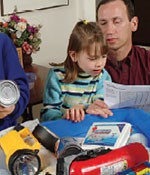Nobody knows just how much damage a storm will cause until it is over. Be prepared for the worst by putting together the following supplies, which you will need during and after the storm. Tip: start collecting your supplies a little at a time from the start of the season. This makes them more affordable.
Drinking Water - minimum of 5 gallons per person. Use pre-bottled water or keep clean containers with tight-fitting lids. Once you fill them, seal tightly, use a permanent marker to write ‘drinking water’ and the date; store in a cool, dark place.
Non-Perishable Food & Beverages - at least a 7- day supply for each person.
Special Needs Items for the Sick or Disabled, such as:
- Buy items in cans, plastic or other unbreakable, water-proof containers.
- If items have paper labels, use a permanent marker to write the name of the item directly on the container, as the label may get wet and fall off.
- Some items do not keep long once they are opened. Buy sizes which you can finish the same day opened.
- Include some high-energy and comfort foods such as granola bars, chocolate, candy, etc., and some hardy fruits and vegetables
- Extra prescription medicine (2-week supply. Ask your doctor or pharmacist for guidelines for storing these.)
- Special foods
- Special equipment
Baby & Children’s Items:
- food and liquid formula, diapers, wipes, snacks, a few favorite small toys or games, etc.
Cooking, Heating Equipment & Fuel:
- Portable stove – e.g. camp stove
- Mini propane/butane tanks
- "Sterno" for heating food
- Waterproof matches or lighters
- Oil and Gasoline for Generators
- Portable cooler / ice chest
- Disposable utensils - plastic cutlery, plates and cups
Tools and Materials, including:
- Can opener - non-electric
- Sharp knife
- Scissors
- Duct tape
- Rope
- Hammer, nails, screws, screwdrivers, wrenches, pliers
- Tarp or heavy-duty plastic
- Work gloves
- Portable Radio -If battery-powered, get extra batteries; consider a wind-up, or solar-powered, radio. These do not need batteries.
- Cell phone, car charger and/or extra battery
- Lighting - 2 flashlights for each person and 2 extra packets of batteries, or wind-up flashlight
- Battery-operated lanterns, replacement bulbs and batteries
Note: It is best to avoid using open flames such as candles or kerosene lamps for lighting as these carry a great risk of starting a fire. Flashlights provide the safest light.
Personal Hygiene, Sanitation & Health Aids:
- Toiletries
- Paper towels
- Toilet paper
- Insect repellant
- Hand sanitizer
- First-aid kit
- Bleach (pure, unscented)
- Water purification tablets
- Heavy-duty trash bags
- Containers for sewage - at least two 5-gallon buckets, with tight-fitting covers. Line with plastic bags
- Cash
Important Documents
Keep these records in a waterproof pouch in a convenient place known to all family members. When a storm is threatening, place your pouch in your survival kit. The pouch should include the following:
- Personal identification, Passports and travel visas (or waivers)
- Immigration records/permits
- Other travel documents such as airline tickets
- Emergency contact list and phone numbers
- Bank and credit card account numbers
- Insurance policies & papers – household, auto and life
- Inventory of valuable household goods
- Contracts, deeds, stocks, bonds and will.
- Family records (birth, marriage, death certificates and immunization records)
Pet items
- Pet carrier(s)
- extra pet food
- water
- litter
Extra Gasoline for Vehicles/Generator (at least 7 day supply)
Jumper Cable for Vehicles.
Blanket, Sleeping Bag, Small Pillow for each Person
Storing your Supplies
Pack smaller items in waterproof containers and store on a shelf or countertop away from the floor in case of flooding. Tie bigger items down or store in a safe place where they won’t float or blow away.
Generators: Remember that generators should be stored with oil - but not gasoline, which can ignite easily.
Grab and Go Survival Kit
Conditions may change suddenly in an emergency and you may have to leave at a moment’s notice. When a hurricane threatens, get together a personal survival kit from your supplies or, better yet, prepare it beforehand. The kit is a bag or other portable container with your most important emergency items, which you can just grab if you have to go in a hurry. Each family member should have one.
It should contain:
- Drinking water for at least three days (see guidelines above)
- Food and drink for at least three days - lightweight, compact, water-proof- packaged, non-perishable items that don’t need
- cooking, heating or refrigeration and which can be eaten from the container
- Change of clothing and sturdy, protective shoes; rain gear, hat, sun glasses
- Sleeping bag, mat or blanket
In addition, the kit for each adult and each child old enough to carry them should contain:
- Personal identification and other important documents (see box)
- Portable radio, flashlight and extra batteries
- Cell phone and charger/ extra battery
- Can opener, utility knife, utensils
- Cash (including coins)
- Prescription medicine if necessary (Ask your doctor or pharmacist for guidelines for storing these.)
- Eyeglasses if used (extra pair and/or a copy of the prescription)
- Extra keys for house and vehicles
- Special items for children, elderly or those with special needs
- Store other valuables in a water-proof container on the highest level of your home to minimize the chance of them becoming soaked.

